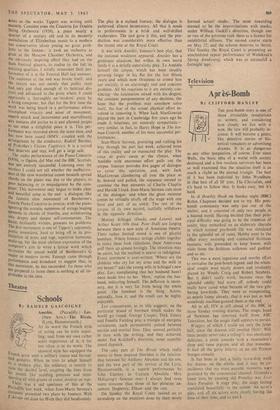Theatre
Schools
BY BAMBER GASCOIGNE
A medee. (Piccadilly.)—Luv.
(New Arts.)—The Rivals. (Lyric, Hammersmith.) Ar its worst the French style of acting can be truly appal- ling; and, from my own rather scant experience of it, it far too often is at its worst. The
classical style has equipped the French actor with a military stance and formal- ised gestures. When he tries to adapt himself to a modern play, his tendency is merely to raise the decibel level, erupting the lines from his mouth like scalding potatoes and inter- spersing all with grunts of ennui. douleur or rage. There was a sad specimen of this at the Piccadilly last week, when Jean-Marie Serreau's company presented two plays by lonesco. With L',4venir est dans les CEufs they did handsomely.
The play is a stylised fantasy; the dialogue is patterned, almost incantatory. All that it needs in performance is a brisk and well-drilled exuberance. The cast gave it this, and, the pro- duction was considerably more effective than the recent one at the Royal Court.
It was with Amedie,ionesco's best play, that the national weakness appeared. Amedee has a grotesque situation, but within its own weird limits it is a strictly naturalistic play. To Amedde himself the corpse, which has been steadily growing larger in his flat for the last' fifteen years and which now threatens to crowd him out entirely, is an alarmingly real and concrete problem. All his reactions to it are entirely con- vincing —the fascination mixed with his disgust, the constant postponement of any decision, the hope that the problem may somehow solve itself, the fear of the actual physical effort in- volved in removing it. When Jack MacGowran played the part in Cambridge five years ago he made it hilarious, yet intensely sympathetic— very similar, in fact, to Harry Hope in The Ice- man Cometh, another of his most successful per- formances.
Jean-Marie Serreau, posturing and rattling his way through the part last week, achieved none of this reality and so massacred the play. The coup de grace came at the climax, when Amdd6e with enormous effort pulls out the corpse. lonesco provides five pages of dialogue to cover this operation, and, with Jack MacGowran clambering all over the place as he heaved and pulled, the sequence seemed to combine the best elements of Charlie Chaplin and Harold Lloyd. Jean-Marie Serreau cuts most of the dialogue; and when the great moment comes he virtually strolls off the stage with one boot and part of an ankle. The rest of the corpse, of its own accord, tactfully withdraws in the opposite direction.
Murray Schisgal (Ducks and Lovers) and Arthur Kopit (Oh Dad, Poor Dad) are forging between them a new style of American theatre. Their rather limited mood is one of playful bombast. Where lonesco strings clichés together to make them look ridiculous, these Americans puff them up almost lovingly. The intention may be satire, but the method is nearer to indulgence. Every sentiment is over-written. 'Where are the children who cry for my arms and the milk in my breast?' asks the young wife in Schisgal's new play, Luv, complaining that her husband hasn't once made love to her. 'Here,' replies the hus- band, indicating himself. The deflation is neces- sary, but it is very far from being the whole point. The bombast is the thing. Actors, naturally, love it; and the result can be highly enjoyable.
Luv concentrates, as its title suggests, on the particular brand of bombast which makes the world go round. George Cooper, Dick Emery and Fenella Fielding play a triangle of energetic caricatures, each permanently poised between suicide and marital bliss. They seemed perfectly in tune with the writing, and they achieved, under Ted Kotcheff's direction, some superbly timed slapstick.
The only part of The Rivals which really seems to have inspired Sheridan is the relation- ship between Sir Anthony Absolute and his son, and the best part of the revival at the Lyric, Hammersmith, is a superb performance by John Cairney , as Captain Absolute. Mrs. Malaprop's famous isms I always find even more tiresome than those of her plebeian an- cestors, Dogberry, Elbow and the rest.
On Sunday the Royal Court invited us to eavesdrop on the exercises done by their newly
formed actors' studio. The most rewarding seemed to be the improvisations with masks, under William Gaskill's direction, though one or two of the actresses took them as a licence for uninhibited silliness. The second course starts on May 27, and the scheme deserves to thrive. This Sunday the Royal Court is presenting an unscheduled repeat performance of Wedekind's Spring Awakening, which was so successful a fortnight ago.






































 Previous page
Previous page